Dutch Socialists in the USA
Dutch Socialists in the USA
A report on the visit of SP leader Emile Roemer, General Secretary Hans van Heijningen, and former SP Senator Kees Slager to the United States.
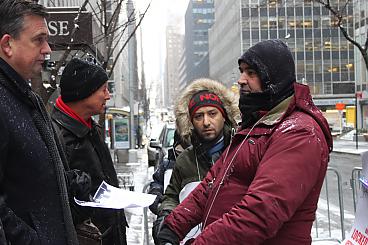
Emile Roemer and Hans van Heijningen in New York City
On our first morning, Wednesday 7th January, we were greeted by snow, which fell lightly as we made our way from our hotel in the heart of New York to the offices of the Rosa Luxemburg Foundation, the German Left Party Die Linke’s research bureau, which has had a branch in the city since 2012. There we met with Albert Scharenberg, who specialises in the recent history of the US and Larry Moscowich, a Jewish American active for decades in the country’s labour movement.
Just like in our own country, it is the people whose position is the weakest in relation to the labour market who are setting the best example: those who work in the car wash, nurses, home helps. Here too labour organisers play a central role in the struggle for better working conditions. Although the progressive movement is little evident on the national level, in cities such as Jackson, Seattle and Minneapolis inspiring events are taking place. Bill de Blasio, New York City’s trade union-backed mayor, is also doing good things, introducing a number of measures in his first few months in office which offer material improvements to the city’s poorer citizens, as well as providing a few hundred thousand unauthorised immigrants with ID cards, for the first time recognition that they also exist, and live in the city.
On the way to the UN we came across a group of people who, stuck behind barriers, walked around and around with placards around their necks which read 'Locked Out’. They turned out to be workers from a restaurant. Their medical insurance had been increased from $700 to $1,100, and they had therefore asked the restaurant’s owner for a $200 per month rise. When they didn’t get it, they called a strike, at which point he fired forty of them. In front of the restaurant doors they had been on strike, with union support, for four weeks, asking people intending to eat there not to do so. New Yorkers were attentive, and supportive en masse, but with tourists things were more difficult.
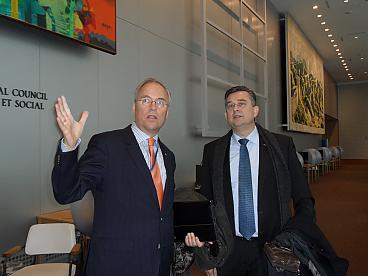
Emile Roemer and Karel van Oosterom, Dutch Ambassador to the UN
We were welcomed to his private apartment by the Dutch ambassador to the UN Karel van Oosterom, he and his staff informing us about their work, after which we were shown around the UN complex on the Hudson river. We were lucky enough to be there in time for the Security Council debate on the UN mission in Mali, where in recent months the political and military situation has deteriorated.
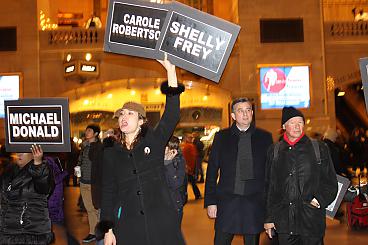
Demonstrators in New York against police violence
From the UN we went to Ground Zero, where the World Trade Centre Twin Towers, destroyed on 9/11 – September 11th, 2001 – once stood. In Grand Central Station on the way we bumped into dozens of demonstrators protesting against police violence and police racism. They were a striking mix of young and old, black and white, alternative types and conventionally dressed people. They held up placards bearing the names of victims. Many called out the names, alternating with slogans. A confrontation threatened between the demonstrators and police, but no-one today seemed to see this as in their interests.
Night had fallen when we arrived at Ground Zero. At the corner of the new WTC building there’s a museum in memory of the almost 2,800 victims of the 9/11 attack. In front of it stands a large monument consisting of an impressive construction in which water runs down along the sides before disappearing in the middle of the enormous basin into a large square black hole. Into the marble edge of the monument are carved the 2,797 names of the people who lost their lives in the terrorist attack which in the last thirteen years has so changed the world. .
Integration doesn’t just happen
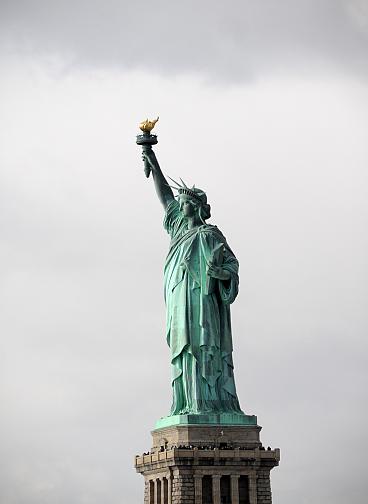
The Statue of Liberty in New York
On our second morning, Thursday, we were up early and heard the news from Paris about the terrible attack, my reaction to which has already appeared on this websitehttps://international.sp.nl/news/2015/01/sp-leader-emile-roemer-whoever-.... Suffice it here to say that it seemed unreal to be confronted with this so far from our own country, and unbelievable that young extremists should create such a bloodbath among journalists and cartoonists. We must never bow to such violence. It was heartening to see so many people in so many countries pouring spontaneously on to the streets in defence of freedom of expression.
This morning we are going to Ellis Island, site of the Statue of Liberty, and the arrival point for more than twelve million immigrants who arrived in New York between 1892 and 1954, which now houses a museum dedicated to them. The exhibition takes up the space which once housed the reception centre itself, including the former clinic and dining hall, prison and administrative area. The new world, the land of unknown possibilities, but also of blood, sweat and tears, of the tragic fate of the Native American peoples, the black slaves and the immigrants themselves, who came from all over the world. Integration doesn’t just happen, it has to occur gradually and can easily be disturbed by exclusion and violence.
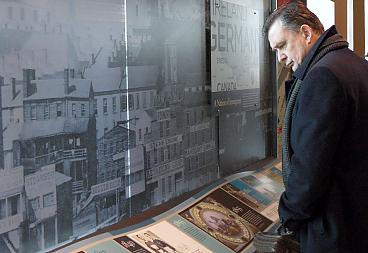
Emile Roemer in the immigration centre on Ellis Island

Emile Roemer speaking with Ethan Young
This afternoon we spoke at some length with Ethan Young, an activist on the American left. One of the themes of our talk was the incomplete emancipation of the black population. New York may be witnessing a change, Young told us, as not only blacks but ever more whites have had a bellyful of racist police actions, the further self-enrichment of the already superrich, and of white supremacist groups, small but seemingly trigger-happy. There is an atmosphere of change, but at the same time Young stresses its fragility.
Arriving at JFK, New York’s airport, we discovered that our flight to Washington, DC had been cancelled. No right to compensation here.
Washington
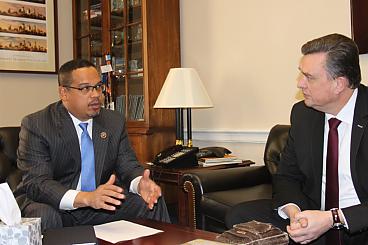
Emile Roemer in discussion with Rep. Keith Ellison (DFL-Minnesota)
So around midnight we arrived in Washington by train, and the next day visited the Martin Luther King Memorial before meeting with Congressman Keith Ellison, an African-American, a Muslim, and a representative of the left current in the Democratic Party. He had nice things to say about the SP, about Amsterdam, and about bicycles as urban transport. In last November’s election he was returned on the Democratic/Farmer-Labor ticket with more than 70% of the votes. He gives his priorities as reform of the prison system, increasing the minimum wage, prevention of evictions and placing restraints on the financial sector. The relatively autonomous status of America’s individual states enables Ellison to record a number of gains. He’s proud, for example, that the police there behave appropriately and that people of colour do not suffer the level of harassment and the arbitrary arrests which are their lot elsewhere. He has also made it easier for immigrants to send money home. And just like ourselves, Ellison is struggling with the question of what the government should do to avoid the derailing and radicalisation of young disadvantaged Muslims.
Bill Fletcher, a respected black activist of the left, was the next to welcome us. He gave a convincing explanation of what was wrong with American democracy. Both Republican and Democratic Parties have embraced neoliberalism and fight each other for the political middle ground. To get to the top in politics you need tens of millions of dollars, which means that no ‘candidate from outside’ has any chance at all. Because Obama had not dared to mobilise the people, he has not been able to make good on his promises of hope and change. Yet, Fletcher argued, there are the beginnings of change, ‘in the movement against climate change, resistance to racist police actions, organisations of blacks and Latinos, the women’s movement and the movement of gays and lesbians.’
To get into the Senate and the House of Representatives you have to pass through security. This was slow, but once inside, the reception from cloakroom staff, guides and others is exceptionally friendly. In both Houses we heard speeches from members on such subjects as the Alaska pipeline, the law on internal security, dangers to which police officers are exposed, all of which were delivered to almost empty halls. When we asked about this, an official told us that ‘nobody listens to these tales. They’re recorded, sometimes something will appear in the media, and that’s that.’
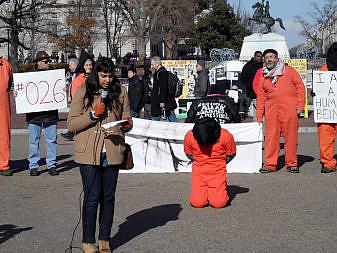
Protest demanding the closure of Guantanamo Bay
We passed the White House, where you’re not allowed to stop, and for the third time in four days came across a demonstration. Some fifty people, some of them in orange overalls and black hoods, formed a large circle to remind Obama that he had promised to close Guantanamo. The protest was professionally organised, with readings of letters from detainees and ex-detainees. Further up the street stood a woman with a rather shabby tent, there to make known her displeasure at the US intervention in Iraq. There was also an anti-abortion demo, with photos of destroyed foetuses and signs saying ‘God is great’ and ‘Life is holy’.
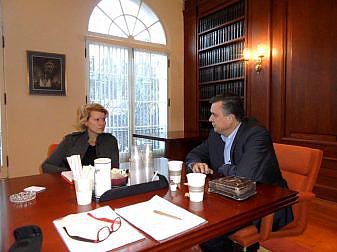
Emile Roemer talking to Krystine Peter
Krystine Peter is the head of the international department of the Union of Auto Workers (AUW). The crisis in the sector has meant that the number of AUW members has fallen from 1.5 million to 400,000 in recent decades. Car producers have almost all closed in the former bulwark of the industry, Detroit, and moved to the southern US, where workers are sometimes paid a ‘gratuity’ of $15 per hour, and to Mexico. The low level of wages means that many European and Asian car makers have moved to the southern states, where they often take no notice of workers’ rights and, with the help of fancy lawyers, corporations such as Mercedes, Honda, Kia, Hyundai and Nissan keep their factories union-free. The UAW recently presented a complaint to the OECD regarding the behaviour of Renault and Nissan in Mississippi. Regarding the TTIP, Peter had a clear message for Dutch workers: In God’s name do your best to oppose this trade treaty, because it will bring American standards into Europe. Transnational corporations, like water, always seek the lowest level – in their case of wages and working conditions. ‘Resist, and avoid falling right into the same pit as we are in.’
Emile Roemer in de VS: Detroit’s loss, Detroit’s opportunities
At 75 Dianne Feeley has been politically active since her youth, in movements for the homeless in New York, against the Vietnam War, and in solidarity with the Sandinista revolution, travelling to Nicaragua in the 1980s to plant trees. Twenty-five years ago she moved from New York to Detroit. Having failed to accumulate adequate pension entitlements, she decided to find work in the auto industry. In no time she won the confidence of her workmates and led the strikes against wage dumping and deteriorating working conditions, sometimes without official union support. She retired ten years ago, but remains active and militant. When she left her workmates told her that it was a shame she was going, she told us, though they felt she had earned her retirement. ‘But I still feel the pain of it. Because the bosses had destroyed our pride and our pleasure in our work. For decades if you worked in the auto industry you were somebody, but that’s all in the past now.
‘The loss of the Big Three – Ford, General Motors and Cadillac – began with the outsourcing of suppliers, removing productive capacity from the city’s centre to satellite towns and then to the south. Aside from purely economic considerations, what also played a role was that we workers were too well organised. Overtime, shift work and weekends were paid extra, we had trial periods and a secure job with retrospective payments, withheld during the trial period. After a life of hard work, when you went on pension you need have no worries. But that’s all gone.’ She told us that the movement south had often had the support of the union leaders ‘who didn’t see or didn’t want to see that groups of workers could be played off against each other. The big corporations pushed the city of Detroit, which was totally dependent on them, into crisis and poverty. In this city, where blacks had fought with success for their rights and had managed to win a better life for themselves and their children, where pride, self-awareness and Motown music were the keys, are now growing up as the umpteenth generation with no prospects.’
A number of the black people with whom we spoke were convinced that their town was deliberately destroyed by a white business elite determined to check the rise of black workers. By closing companies down, introducing crack and heroine amongst the young, and mass incarceration, and by means of excesses of police violence, the black community would be broken. ‘Some of my black workmates experienced terrible things in the south’, Dianne told us, ‘so many southern blacks were attracted to Detroit, where they saw a chance to build a better life. Although the time of racial segregation is fortunately behind us, relations between black and white on the shopfloor remain uneasy to this day. When one of our most popular foreman died a violent death a few years ago, some five hundred people came to his funeral, but you could count the number of white workmates present on your fingers. Whites often feel uncomfortable around blacks, who are a bit more expressive than they are at funerals or in church.’
The African-American crisis manager who has run Detroit’s bankruptcy knew very well that for her own people the crisis would not pass quickly. Retiring workers lost 20-30% on their pensions and had to meet a higher proportion of their medical costs. This year threatens to see tens of thousands of families forced on to the streets because they can no longer pay local taxes, which are based on outmoded house valuations, overtaken by the collapse of the real estate market. Public transport has gone, and two-thirds of the city’s population are unable to afford a car or pay taxi fares. The local authority is completely broke, unable to provide any services other than police, fire and ambulances, which operate at a minimal level. Today’s Detroit Free Press reported that the region’s public prosecutor has announced that an inadequate budget has meant that in recent years ten thousand reported rapes had gone uninvestigated.
As for new local authority projects, the city administration has in recent times gone no further than to provide 100 million dollars in subsidies for infrastructure projects, lay a tram line of three kilometres connecting an up-and-coming yuppie neighbourhood with the city centre, and facilitate the provision of three gigantic casinos. ‘I’ve been in one of them just once,’ said Dianne, 'but it brings tears to your eyes to see what sort of people are walking around in there. By far the most of them are poor souls gambling their last money in the hope of the jackpot'.
On the way to a meeting with young black activists, our cab driver stopped at a crossroads where an African-American man sat begging with a board round his neck, in temperatures down to 20 degrees. The driver gave him two dollars and stepping back into the taxi said, ‘sure there’s work, and there are a lot of guys who are into drugs and make a mess of their lives, but if you can’t work because you’re sick, you’re the victim.’
In an office inside a church we met with two young activists and an older man, a graduate of the university of the streets. They spoke appreciatively of Obama and the way he had given millions of people access to health insurance and abolished the first two years of community college fees. But as long – in their words – as there are more prisons than community colleges in black areas, something still needs to happen. Having to pay gigantic sums for vocational and higher education means that many young black people have no chance in life. Insofar as they do study, they feel forced to study for trades and professions where there is a possibility of finding a good job. Black youth have little to say to politicians, ‘but giving up is not of course an option,’ says Price, who is a music producer. He makes sound tracks, short films and socially and politically responsible ads, as well as organising free shops, and a 3-d printer, currently in use for the construction of an entire house. ‘And it’s great,’ he said, that by working with young people in this way, you give older people new energy too, that you linked the generations a little. Because you can’t speak about a community as long as young people are saying that their lives are just as shit as those of their parents.’
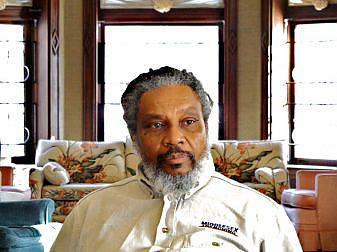
Darryl Jordan, EMEAC Senior Organiser
'We fought, we lost, but we have to get back in the ring,’ said Darryl, a man in his mid-fifties, a former Black Panther who is now Senior Organiser for the East Michigan Environmental Action Council (EMEAC). 'I sometimes think back to how our mayor Coleman Young reacted when the courts ruled that the Ku Klux Klan must be allowed to demonstrate in Detroit. “That’s fine,” Young said, ‘but then I’ll give the police and ambulance service a compulsory day off.” Not a one, I recall, not a single white racist turned un the day of the demonstration.
‘But times have changed. Many of our people are now occupied with surviving and in that we have to support them. Work together, by for example setting up cooperatives.’ He wonders how anyone can cut people off when they can’t pay their electricity bill. ‘At night people are in darkness, giving crime a free hand and the police an alibi for not going into certain neighbourhoods. In Harlem Park, along with a group called Sol-Idarity, we’ve installed solar panels. showing in this way that we wouldn’t be forced into darkness.’
Will Copeland is one of the driving forces within the East Michigan Environmental Action Council. One of the many things with which he is involved is attempting to stop people from having their water supply cut off, something which could happen this year to 35,000 families. ‘The local authority-owned water company can be accused of “black bashing” by creating an image of people who can’t find the money to pay their bills but walk around in expensive new trainers, etc. The company makes customers fork out for the costs of the loans which it has taken out, but of this they make no mention. That we managed to involve the UN in this problem and that they announced that Detroit’s water policies are an infringement of human rights is very pleasing. Normally it’s countries and towns which have profound problems which this happens to, but in this case our local authority executive look complete fools. That our former mayor a short while ago was given thirty years for corruption says it all.
'Not only are we trying to give people correct information,’ Darryl continued, ‘but also to train people from the black community to be leaders, and to bring people from different areas into contact with each other. Because despite everything Detroit is a world city, a city with culture and a musical tradition of which we should be proud. Bolstering self-esteem is a precondition of fighting for your rights and for a liveable city. We’ve got a few hundred people involved in this in Detroit. Fewer young people than ten or twenty years ago find themselves in the shit through drugs, and also violence within families and on the street is considerably lower than in the recent past. We’ve still got a long way to go, but in any case we know which way we have to go.’
